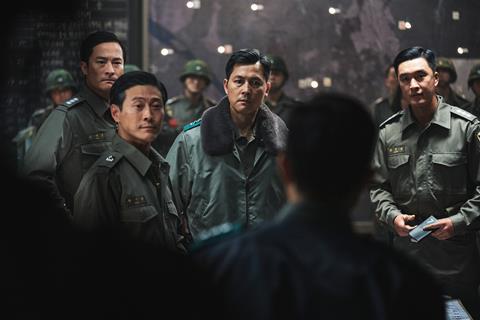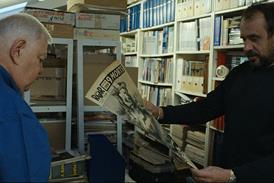Kim Sung-soo’s drama about the 1979 Seoul military coup is one of South Korea’s biggest box office hits ever

Dir. Kim Sung-soo. South Korea. 2023. 141mins
As a fictionalised account of the military coup that was orchestrated in Seoul in the winter of 1979, 12.12: The Day applies the structural framework and narrative tactics of the thriller genre to a horrifying moment from modern history.
Not only the most successful South Korean film of 2023 but also number nine on the country’s all-time chart, including foreign titles
In dramatising how General Chun Doo-hwan set himself on path to becoming the President of South Korea, Kim Sung-soo’s expertly mounted film joins a group of politically forthright mainstream South Korean titles which also includes Jang Joon-hwan’s 1987: When the Day Comes (2017), Jang Hoon’s A Taxi Driver (2017) and Woo Min-ho’s The Man Standing Next (2020). Although not produced in conjunction, these four films effectively chronicle two dictatorial regimes and the considerable risks taken by state servants and civilians alike to challenge authoritarian rule.
12.12: The Day has proved to the biggest hit of the bunch at the domestic box office, with a whopping $96 million accumulated since its release in December. This not only makes it the most successful South Korean film of 2023 but also puts it at number nine on the country’s all-time ticket sales chart, including foreign titles. The film’s staggering popularity is a result of its surprising cross-generational appeal. Although the audience for military-themed fare usually skews older, 12.12: The Day has registered with twenty- and thirtysomethings, a demographic which has enhanced the film’s social media profile through a viral smartwatch challenge whereby viewers posted their heart rates to show the intense emotions stirred by watching the film.
Internationally,12.12: The Day is likely to draw a respectable turnout in limited theatrical engagements and attract plenty of eyeballs on streaming. Strong word of mouth will be generated by its timely reminder of how malign forces can suddenly take advantage of moments of uncertainty.
The film opens in the aftermath of the assassination of President Park Chung-hee, a dictator who maintained rule from his own coup in 1961 until his death at the hands of one of his own inner circle. Tasked with investigating the assassination plot is General ’Chun Doo-gwang’ (Hwang Jung-min, clearly playing Chun Doo-hwan regardless of the name change). Chun uses the assignment as a means of asserting power by creating a make-believe conspiracy to cast suspicion on anyone who stands in his way. He is also the head of a secret society comprised of military officers who have been overlooked for higher rank due to their lack of elite connections.
Deeply worried about Chun’s increasing control, Army Chief of Staff Jeong Sang-ho (Lee Sung-min), appoints Lee Tae-shin (Jung Woo-sung) as the new Commander of the Capital Garrison Command. This is a post which entails protecting Seoul against marauding military units, including those led by a rogue general. Jeong’s choice is a sound one, as Lee is a straight-arrow soldier with little interest in political affairs – but he has failed to anticipate the extent of Chun’s strategic planning.
12.12: The Day marks a tremendous return for Kim, whose last film was celebrated crime epic Asura: The City of Madness (2016). The lengthy running time flies by due to his marshalling of the rebellion (or “grand revolution” as Chun has the gall to call it) into a nail-biting thriller complete with confidently handled set-pieces, expert cross-cutting and measured use of split-screen.
It is also entirely accessible to viewers with little knowledge of South Korean politics. The scene in which Chun proposes his coup at a secret society meeting is a canny piece of exposition that simultaneously illustrates how the ambitious general sinks his tentacles into subordinates. This gathering becomes increasingly clandestine: doors are closed, then the lights go out. But under the shroud of darkness, Kim’s judicious screenplay sheds light on the myriad motivations that prompted these supposed patriots to participate in the hijacking of their country.
Thereafter, the film methodically focuses on the nine hours between the instigation of the coup and its completion. Kim adheres closely to the facts, but mines suspense from unanticipated complications or Lee’s bravery: Chun’s attempts to lean on the acting President (Jung Dong-hwan) do not initially go to plan and there is a white-knuckle stand-off with Lee staring down an advancing unit on one of the Han River bridges. Lee Mo-gae’s sharp cinematography ensures that the production team’s attention to period detail gets its due, but also evinces a grittiness that gives this recreation of events from four decades ago a real jolt of immediacy.
South Korean blockbusters frequently thrive on pitting high-calibre actors against one another, and Kim has reunited the stars of his previous feature as staunch adversaries. Both deliver in spades, right from an early scene in which lines are drawn during a tense corridor interaction. Hwang vanishes into his role with impeccable makeup providing Chun’s receding hairline and bulbous nose, while the actor channels the notorious strongman leader’s self-possessed charisma and flair for intimidation in chilling fashion. In a less flashy role modelled on General Jang Tae-wan, Jung is suitably stoic yet powerfully conveys the commander’s frustration upon realising the extent of the betrayal that has occurred under his watch.
Production company: Hive Media Corp.
International sales: Plus M Entertainment sales@megabox.co.kr
Producers Kim Won-kuk
Screenplay: Kim Sung-soo
Editing: Kim Sang-beom
Cinematography: Lee Mo-gae
Music: Lee Jae-jin
Main cast: Hwang Jung-min, Jung Woo-sung, Lee Sung-min, Park Hae-joon, Kim Sung-kyun, Kim Eui-sung, Jung Dong-hwan
























